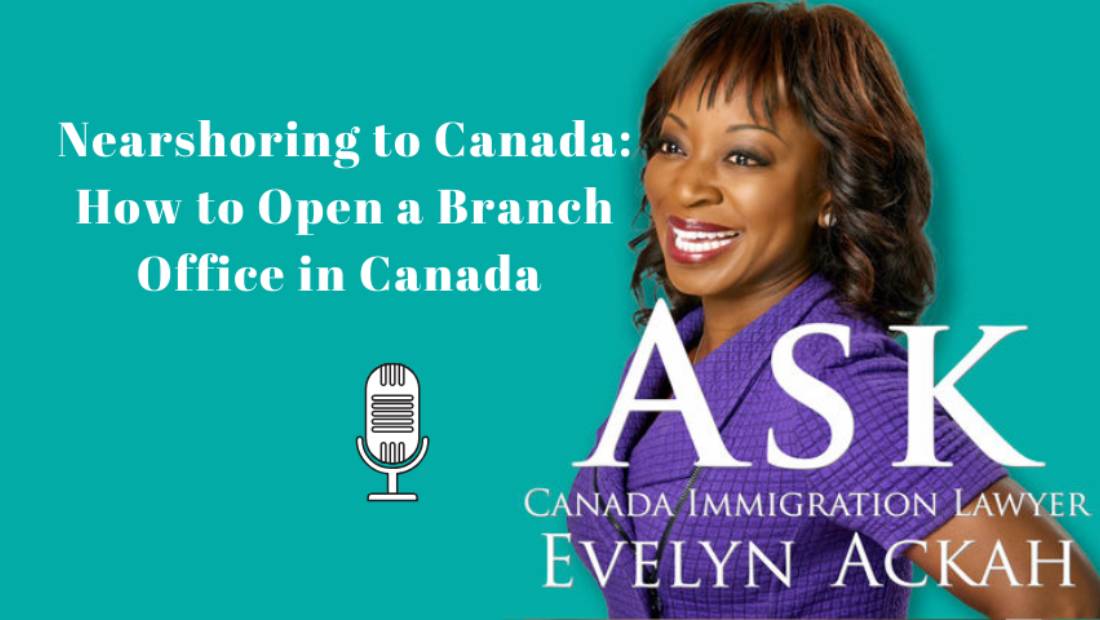Or listen on your favourite podcast app
As American businesses face increased obstacles, taxes and public protests against immigration, Canada is becoming an even more attractive destination for U.S. and other countries to export tech jobs and companies. The current economic and political climate in the United States is forcing many businesses and individuals to reconsider their American business strategy and move their highly skilled and talented workforce to Canada.
What is Nearshoring to Canada?
Many American tech companies are frustrated by their inability to hire highly skilled and educated foreign talent due to scarcity and cost of H-1B visa workers. Nearshoring aka nearsourcing is defined as outsourcing business processes, especially tech and IT processes, to companies in a nearby country, often sharing a border with the target country.
Benefits of Nearshoring to Canada
For American tech companies, nearshoring to Canada has many benefits:
1. Similar culture and language
2. Geographical proximity and common time zones
3. Favorable exchange rate
What is An Intercompany Transfer?
When a company wants to move its skilled workers to Canada from America or another company, we an intra-company work permits and job transfers to Canada or the United States.
Ackah Law can help you with:
- Incorporate a business in Canada when you have a successful business in your home country
- Submit your applications
- Canadian employment agreements
- Help your employees move their families to Canada through family class spousal sponsorship
How to Open A Branch Office in Canada
A foreign company that wants to open an affiliate or branch office in Canada needs to register the business with the local government in each Canadian territory where it will have operations. There are many advantages to opening a branch office in Canada:
1. Canada has tax treaties with many countries so that businesses are not subject to double taxation.
2. Foreign branches are entitled to many of the same rights as a Canadian-owned corporation, such as limited liability.
3. A branch's activities are overseen by the parent company.
Learn More:
- H-1B Visa Denied? Try Nearshoring to Canada!
- Why American Tech is Near-Shoring to Canada
- Canada Is Winning the Global War for High-Tech Workers
We recommend you consult a Canadian immigration professional if you are considering nearshoring to Canada. At Ackah Business Immigration Law, our goal is to help you Cross Borders Seamlessly and to make it smooth as possible for you to be as successful as possible. You need to have information before you can make decisions.
Contact Ackah Business Immigration Law today at (403) 452-9515 Ext. 100
or 1-800-932-1190 or email us directly at contact@ackahlaw.com.
Transcription
Evelyn Ackah:
Welcome to ask Evelyn Ackah Immigration Lawyer podcast, where today we're going to be speaking about nearshoring. If you've heard about it; nearshoring refers to when companies who are operating in other parts of the world, look to establish a related entity and a related company by setting up a business in Canada and then coming to Canada for instance, or the United States and starting their business. That's what we're going to be talking about today. It's called nearshoring, or could also be considered offshoring, I guess. Really it's about the ability for companies to move their highly skilled foreign workers that they want to keep into Canada so that they can establish a business and continue operations and expand their business. That is the goal. Today that's what we're talking about.
Evelyn Ackah:
I want to welcome you again to my law firm, Ackah Business Immigration Law, and also our podcast, which is called Ask Evelyn Ackah Immigration Lawyer podcast. You can ask me anything related to immigration. I'll do my very best to answer all your questions, and we will also be able to provide as much information as possible. If you have more questions or need more guidance, you can always contact us at ackahlaw.com (403), 452-9515 (403) 452-9515 and we'll be happy to talk to you about anything immigration related.
Evelyn Ackah:
Today I'm really excited to talk to you because one of my favorite types of applications we do for clients is relating to intercompany transfers. Intercompany transfers are when somebody is already operating a business in another country, and then they decide they want to expand to Canada, or they want to move to Canada and they want to use this as a way to move to Canada for their business and for their families. We do this quite a bit for clients who are very successful and established in parts of the world like India and China and parts of Africa, and the United States and Mexico, of course, where they're already operating, they're already hiring people, they're already having successful business, and now they want to talk about how to bring those people to Canada in order to grow their business. That's what we do. We can certainly assist with that.
Evelyn Ackah:
What we do then is we will help them incorporate a related company. We help with incorporating a branch or a subsidiary organization in Canada, in the city they want to operate or work out of. And then we do the entire intercompany transfer process. So for a company, let's say you're a software company and you're in Silicon Valley and you have some wonderful H1B workers you want to keep, but they don't have their H1B renewals, or they don't have their green cards yet, and you want to figure out how can I keep them on the same time zone as I'm operating in and I want them to work from Vancouver, British Columbia, Canada, we would help incorporate the business. We would help you even sometimes find space by way of shared office spaces for now, small space, where your people can work out of.
Evelyn Ackah:
Then we do the details related to the intercompany transfer. That means we will do the paperwork, we'll incorporate, we will work on the forms and the application. And that application then gets submitted to the Canadian Consulate in the country where your foreign worker is working currently for you. They get processed, a work permit based on either specialized knowledge or managerial, senior managerial executive experience. Those are the intercompany transfer categories.
Evelyn Ackah:
Just please do keep in mind that your person must have worked for your related company for at least one year, at least one year before they can be considered eligible for the transfer. Because we have to be able to show they have expertise in something, they know your business, they know how you operate, they know what you do best, and they know that they have proprietary information that they can bring and share with you and with your staff that you're going to hire in Canada or the United States. That's how it works. They're bringing some knowledge about the business that's going to help. And then they're going to also benefit Canada and Canadian employees that you will hire by training them and sharing best practices, sharing knowledge, and proprietary information. That truly is the goal. That is how it works.
Evelyn Ackah:
We call it nearshoring because instead of going far away, they're actually coming close to where you're already operating. So they can still be operating in the same time zone, they're on the continent with you, but they're working for a different company in another country that will allow them to work and then move to permanent residence much sooner than if they were in the United States.
Evelyn Ackah:
As well, sometimes people come and they work for a year or two in Canada, then you're able to send them back to the United States if you still need them there, for instance, because then they can work as intercompany transfers under L1 Visa. And then they have another stream that's going to help them to move to permanent residence in the United States under green card.
Evelyn Ackah:
This nearshoring strategy is one we've been using for a number of years. It's getting busier. It's getting more popular because companies are realizing we do not want to lose great people. If they're doing a great job and we want to keep them, they have great knowledge, and the only issue is that they don't have their green card status, they don't have their permanent immigration status, but we want to keep them in the fold of the organization, this is how to do it.
Evelyn Ackah:
Again, it's called nearshoring. Any of you that have companies or work for organizations right now that may want to expand to Canada or the United States we can assist you with that process of expansion. Feel free to give us a call at Ackah Law, (403) 452-9515, extension 100. We can help you talk about the strategy and put things in place. We also have a business bundling plan right now, actually, where you come into us and we help you with the incorporation and the setup of your business, we help you get your tax number, we help you look for space, we do all of that in a package, and we do the work permit for you as well, so you can get your needs met all in one place. We can help you as well with the Canadian employment agreement. We can look at what you currently have and also make it Canadianized so that you have your best chance of success here with your new employee that's going to be in Canada and we can move from that process.
Evelyn Ackah:
I'm hoping that this is useful information to you. If you have any questions at all about nearshoring or intercompany transfers, or setting up a new business in Canada, because you already have an existing successful business in the home country, we can assist you. It's more difficult to set up a brand new company in Canada if you don't have experience running a business in Canada. But if you already have experience and you're successful, we can talk about nearshoring, we can talk about offshoring, we can talk about intercompany transfers and other ways to help you. You can bring your family with you. When you move to permanent residence, the entire family will move to permanent residence as well. That is the goal.
Evelyn Ackah:
Again, we're here for you at Ackah Business Immigration Law. I'd love you to check out our podcast. Please sign up and join and subscribe. It's free to our Ask Evelyn Ackah Canadian Immigration Lawyer podcast. You can find it very easily on all the normal podcast sites. Feel free to sign up and subscribe. I'm going to be doing more and more of these as time goes on so I can share my passion, my interest in immigration law with you.
Evelyn Ackah:
Today, right now, it looks like we have some people calling in. We have [Asum 00:08:30]. He's interested in welding. Let me answer your question, Asum. You're saying you want to come to Canada as a welder. I always tell people this; we do not find jobs for people to come to Canada. We are not a job finding company. We are a law firm. You need to make some efforts to look for jobs for yourself. Some of the places you can find jobs are on the Canada Job Bank website. The Canada Job bank website is a website where companies across the country post positions they're looking for. So you can search welder and look for different locations where they're looking for a welder with your experience, and you can reach out directly to the employer. You can even go through interviews through Skype and WhatsApp and FaceTime.
Evelyn Ackah:
If they're happy and they want to offer you a position, then you come to us because the employer will need immigration assistance to bring you from your home country, then we can assist you. But we do not find employment for anybody. Our job is to be the lawyers once you've identified a Canadian employer who has given you a job offer.
Evelyn Ackah:
I hope that's helpful to you. Check out the Canada Job Bank. Check out the Welders' Association and other welder trades kind of organizations in Canada, and do your research to try to find the right position for you, and then we'll be happy to assist you at any time you're ready. Okay?
Evelyn Ackah:
Calvin says, you're interested ... I'm not sure exactly what you're interested in. If you can give me some more details. What can I help you with when it comes to immigration to Canada? Again, we don't find jobs. We help you when you have identified a job, or if you want to move as a business person it's great to be able to show you've got a significant revenue base, at least a profit or revenue, I would say of 2, $300,000 Canadian. This is not for people that are just starting up in your home country to then come and start-up here in Canada. They need to see that their chances of being successful are high if you're coming here for nearshoring or for intercompany transfer to set up a business in Canada.
Evelyn Ackah:
I'm hoping this is good information for you. If you have specific questions for us at Ackah Business Immigration Law, give us a call at (403) 452-9515, we'd be happy to help you or contact at ackahlaw.com. You can reach us through our website as well, ackahlaw.com.
Evelyn Ackah:
I'm getting to the end of my chat, but I want to tell you some of our successes when it comes to nearshoring. This is always the most fun for me.
Evelyn Ackah:
We've had clients come here who have wonderful businesses in their home country and they're nervous about, "Oh, is it going to work? Am I going to get approved?" Maybe they don't have a lot of travel history because they've stayed, let's say in India for their entire business career. We have been successful at making successful applications to bring them and their families by incorporating ... We ask for a lot of information because we have to feel comfortable that you're going to be successful before we will take your file. That means we need to see your financial statements. We need to see your revenue numbers, your payroll records, your staffing numbers, see you're paying tax, your bank account information. We need to know that you have the foundation of being a successful business, maybe with a great product that makes business sense to come here.
Evelyn Ackah:
We don't do the business planning, but we also have partners we work with who help with the business planning and we can help put together a strategy for how you're planning to grow in Canada and why the Canadian market is so good for you. Why are you looking to the Canadian market to grow and to be successful?
Evelyn Ackah:
When we put all that together, then we submit and all the applications and the forms, we upload it to the Canadian Government website, where we do the immigration portal. And then the government goes through its process to review your business numbers, your police certificate, your medicals, your biometrics, all of that information background to check that you're going to keep your business operating. That is one of the conditions of an intercompany transfer. You keep your business operating in your home country and you have your staff and you continue running it with maybe a designate or vice president or somebody else, and then you move with your family and you launch the Canadian operation. That is how we transfer you.
Evelyn Ackah:
We've been very successful with clients in both Silicon Valley and other parts of the United States, in Denver, Colorado, in California. We've helped a number of people looking to leave the United States who are business owners, who continue to employ their team in the home country, in the home state and then they come to Canada. They love the lifestyle here. They love the opportunities here and the space to grow and expand their business and the larger market. They also love it if they're coming from China or India, let's say, or Eastern Europe, they love that they are so close to the US market. Again, they can start in Canada and over time they can also grow their market into the United States. So it's a really nice platform for launching; starting small, and then launching on a larger scale than into to the United States.
Evelyn Ackah:
We've had a lot of success with that. I love to do it. It really helps them and creates opportunities for their children who want to go to school here in Canada, maybe go to university in Canada over time. They become permanent residence and then they become citizens. It is really one of the most gratifying parts of my job is we're creating jobs for Canadians as well, which is what we always want, of course, with bringing great technology, great leaders of industry into Canada to expand our marketplace and train Canadians and create jobs. We're also helping on a personal and professional level, your business to come to Canada.
Evelyn Ackah:
I hope if you hear anything about nearshoring, if you have any interest in nearshoring, you want to talk about if your business is going to be a good candidate or good eligibility to move to Canada under this category, that you'll call me. I'd love to talk to you about your business and learn more about what you do and share as well what we do for our great clients at Ackah Business Immigration Law. We have a lot of case studies of success. We've got clients that will be happy to give you referrals about our success and our ability to help them.
Evelyn Ackah:
We also connect you with great accountants that have experience with Canadian and international tax. This is really important. Before we even start the incorporation I always tell people, make sure you're speaking with a tax advisor that knows either Canadian and US tax, or Canadian tax, as well as tax from your home country. We want to put you in the best, best financial position when you get here so that you don't get dinged with significant tax because you didn't structure properly at the front end. That's very important when you start.
Evelyn Ackah:
I hope this has been helpful. Feel free to give us a call. We're here all the time. We are open for business, even though we're working from home, most of us. We continue to help our clients to cross borders seamlessly, to move to Canada to take advantage of wonderful opportunities and to help you create legacy for your business and for your family. Take care. Have a great day. Bye-bye.












